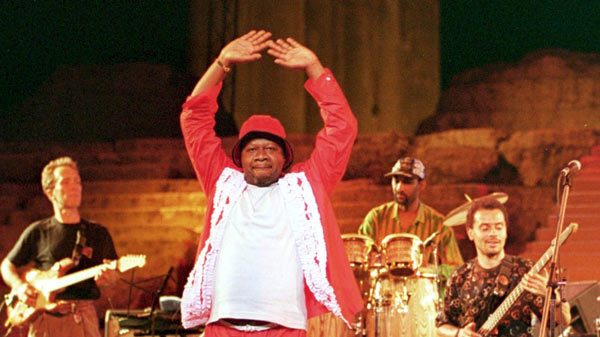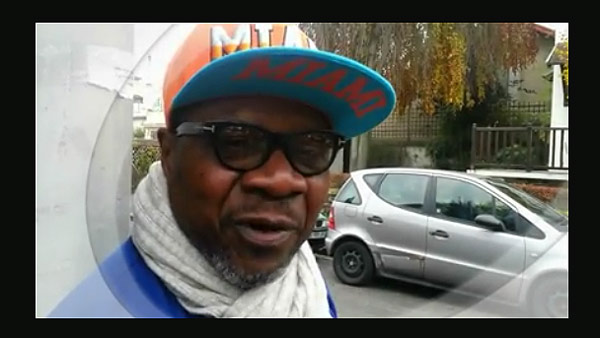WRITTEN BY PRINCE ABENGE
Researcher in African Studies

Papa Wemba, whose career spanned five decades, first burst onto the African music scene in the 1960s (Reuters)
Singer and song-writer, actor, husband, father and philanthropist, Jules Shungu Wembadio aka Papa Wemba was the darling of Congolese musicians. He was only 20 years old in 1969 when he started his unquestionably successful, multi-generationally consequential music career. The son of a former World War II veteran from the Congolese Public Forces led by the Belgians, and a traditional female singer, his parents moved to Kinshasa when Papa Wemba was just a toddler.
He attributed his musical talent to his mother who often took him along to events (including funerals and other social functions) where she performed. Both his parents were of the Otetela ethnic group located at the heart of the Democratic Republic of Congo (DR Congo) in the Sankuru Province. Patrice Lumumba, the first democratically elected Prime Minister of Congo, assassinated shortly after independence in January 1961, was also Otetela.
At the onset of his musical career, Papa Wemba joined the group “Stukas Boys” and with them wrote his first song “Madrigal”. It was wildly successful in the city of Kinshasa and then spread like wild fire to the rest of the vast DR Congo. He drew the attention, admiration and respect of fellow Congolese musicians. He was, as a matter of fact, approached to become co-founder of a new group that was already in the making known as “Zaïko Langa Langa”, one of the oldest bands in the country. With strong golden tenors and riding on the back of his rising popularity, Papa Wemba became a pivotal member of Zaiko Langa Langa, and a new wave of music that they inspired across the continent.
Papa Wemba was an altruistic artist. He groomed, trained and introduced young talent into the music industry, including the renowned Koffi Olomide, Emaneya Kwa Mambu, Reddy Amisi Ngoy, Sangwa Maray Maray, Lidjo Kwempa, Djenga Kisangani Esperant, Stino l’As, to name a few. These young artists joined the Congolese musical arena through the band Papa Wemba himself formed in 1977, known as “Viva La Musica”, a real school of music for junior musicians.
In 1987, Papa Wemba surprised his fans, presenting them with another talent of his when he stared in film “La Vie Est Belle” (Life Is Good), in which he played the role of a young villager who left his rural home and came to the capital city of the Congo looking for opportunities.
Papa Wemba had a deep love for his country and people. This may be the main reason why in the midst of some of the worst strife and deadliest wars the Democratic Republic of Congo went through, he stayed, instead of relocating abroad. He identified with the suffering of his people and provided significant financial support to local charity organisations. He also took care of orphans and destitute youth.
Papa Wemba who collapsed on stage last Sunday April 24, 2016 in Abidjan leaves behind a huge and rich heritage of Congolese music. His most preferred song, especially in the black world is “Esclave” (Slave) in which he pledges the freedom of all African descents who are still going through a chain-less type of slavery, designed by the unjust neo-colonial system that is at the helm of leadership in the world.
He had a host of nicknames including Mwalimu, Kuru Yaka, Bokulaka or Vieux Bokul, Fula Ngenge, Ekumany, Bakala Dia Kuba, Linioko ya Tembe, Vieux Boa, Petit Rossy, Le Parrain. Passionate about dressing smart and travelling around the world, Papa Wemba was also a beloved ambassador of Congolese cultural values.
MUSIC VIDEO
DUNIA Magazine joins the rest of the world in honoring the legacy of the great Papa Wemba.


Dear Prince,
This is a good paper, a well-balanced report in honour of this great son of the DRCONGO. We need such testimonies in order to keep our cultural roots alive, especially in presence of so many attempts from “various invaders and predators” to falsify our History.
Well done.
Dr Katumba
Hi Doctor,
Thank you for encouraging me and for your kind words. I wrote it on behalf of all people who knew Papa Wemba and will keep him their heart through his rich music.
Prince Abenge M.